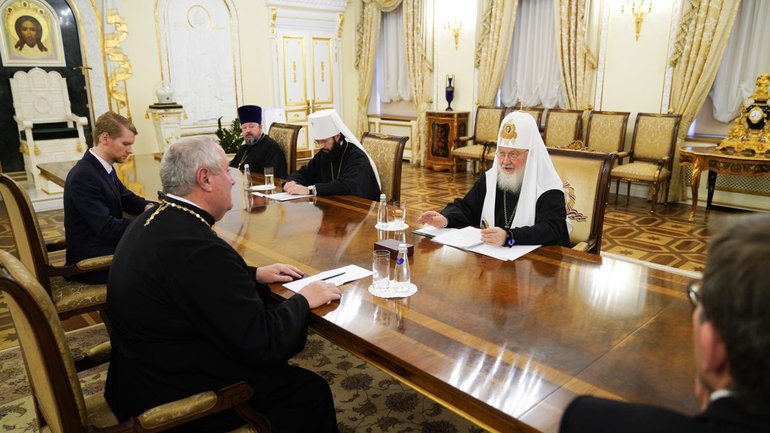Kirill praised the World Council of Churches for its "neutral" position on the war in Ukraine

According to the Spiritual Front of Ukraine, the head of the Russian Orthodox Church noted the neutral position of the WCC. Kirill's words were shared by the website of the Moscow Patriarchate.
He said that "now is a very difficult time, but at this point, the difficulties emerge not from the churches, but from the political context, and this context is extremely dangerous. We have no idea how close we are to a very dangerous development of relations between peoples. Therefore, today churches should not add gasoline to the fire — we must do everything possible to extinguish the burning fire. In this sense, the World Council of Churches' function and the inter-Christian movement are very important. The active but neutral position of the World Council of Churches, which does not support one or another political side in this conflict, is, in my opinion, the only correct one, and it must be observed in the future. Churches, by their very nature, have a peacemaking potential. If a particular church starts waving the flag of war, calling for confrontation, then it opposes its nature."

The Moscow Patriarch, who blesses Russian troops for the war against Ukraine, stressed that in this difficult situation, "first of all, it is important that blood is no longer spilled, buildings and infrastructure are not destroyed, and that people's suffering stops."
Kirill assured that the Russian Orthodox Church is very interested in the objective, unbiased attention of their ecumenical partners to this "difficult and tragic situation. It is important to convince world leaders to bring peace through negotiations and dialogue, and not through bloodshed and destruction."
Archpriest Ioan Sauca, general secretary of the WCC thanked the Moscow Patriarchate for responding to the WCC's letters and stressed that the statements of the World Council of churches were made with the participation of the Russian Orthodox Church: "members of the World Council of churches were waiting for this visit. We came here on behalf of the Central Committee of the WCC. I was instructed to visit our deeply wounded members in the Middle East: in Syria, Lebanon, Israel and Palestine, later in Ukraine, and finally, I arrived in Russia. You are aware of the concerns expressed by the WCC member churches about the war between Ukraine and Russia. You are familiar with the positions that we voiced during the meetings of the Central Committee of the WCC. These statements are developed with the participation, in particular, of representatives of the Russian Orthodox Church. I am grateful for the responses to the letters we have sent you on behalf of the WCC. We came here to understand what we can do together to build bridges of peace and reconciliation, how to stop the bloodshed and prevent the danger of nuclear fire."
Sauca recalled that the proposal to exclude the Russian Orthodox Church from the World Council of Churches was put to the vote "all members of the Central Committee unanimously voted for the preservation of the Russian Orthodox Church in the WCC family, but for the continuation of dialogue, in particular, on theological arguments and support for the war, which, according to some people, were stated in some of your sermons and speeches."
Earlier, the OCU spokesman, Yevstratiy (Zorya), claimed that part of the ROC delegation to the World Council of Churches consisted of FSB officers. The statement of WCC regarding the situation in Ukraine does not clearly and directly condemn the Russian Federation as an aggressor. Instead, in the WCC statement, Ukraine and the Russian Federation are equated with each other and put an equal sign between Russian aggression and Ukrainian self-defense of their own citizens, territories and interests.









